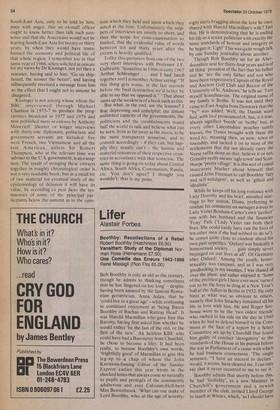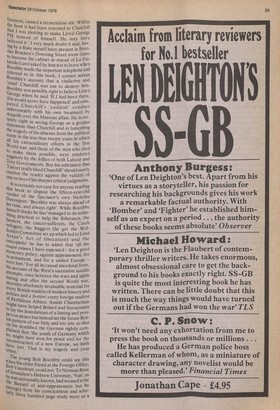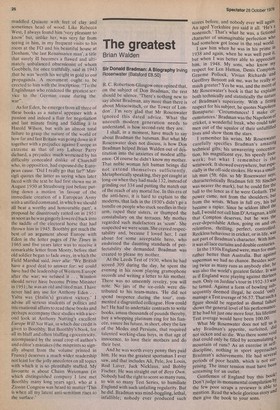Lifer
Alastair Forbes
Boothby: Recollections of a Rebel Robert Boothby (Hutchinson £6.95) Vanalttart: Study of the Diplomat Norman Rose (Heinemann £7.50) Une Comedie des Erreurs 1943-1956 RenO Massigli (Plon Ffrs 65.00) Bob Boothby is only as old as the century, though he admits to thinking sometimes that he has 'lingered on too long' — despite having been assured by the famous Romanian geriatrician, Anna Asian, that he 'could live to a great age' — while confessing to continued enjoyment at 'being Baron Boothby of Buchan and Rattray Head'. It was Harold Macmillan who gave him this Barony, having first asked him whether he would rather 'be the last of the old, or the first of the new'. An heirless KBE who could have had a Baronetcy from Churchill, he chose to become a lifer. It had been really, to borrow Boothby's own words, 'frightfully good' of Macmillan to give this leg-up to a chap of whom the John Knoxious-fuming Editor of the Sunday Express earlier this year wrote in the shocked tones that always come so naturally to pupils and protégés of the consistently adulterous and ever Calvinist-Hell-bent Max Beaverbrook: 'What can one make of Lord Boothby, who, at the age of seventy eight starts bragging about the love he once shared with Harold Macmillan's wife? Just this. He is demonstrating that he is ending his life as a senior politician with exactly the same standards of honour and integrity as he began it: Ugh!' This was quite rough talk by one Sunday journalist about another. Though Bob Boothby sat for an Aberdeenshire seat for thirty-four years and is of all thing proudest of the fact that his father and he 'are the only father and son who have been respectively Captain of the Royal and Ancient Golf Club and Rector of the University of St. Andrews,' he tells us: am myself Scandinavian. The original name of my family is Bothe. It was not until they came to East Anglia from Denmark that the -by" was added. Well, the Danish word bod, with its d pronounced th, has, it it true, always signified 'booth' or 'bothy' but, as every other Lincolnshire poacher surely knows, the Danes brought with them (he word by, meaning then, as now, town or township, and tacked it on to most of the settlements that did not already carry the Norse suffix thorp,so that, believe it or not, Grimsby really means 'ugly town' and Scun thorpe 'pretty village'. It is this sort of casual inaccurate blather about himself that caused John Freeman to call Boothby lazY and self-indulgent', as well as 'gifted and While he keeps off his long romance with Lady Dorothy and his brief, annulled marriage to her cousin, Diana, preferring to confine his comments on menages a-trois to Lady Violet Bonham-Carter's own 'perfect' one with her husband and the financier 'Foxy' Falk (`Lady Violet ran both their lives. She could easily have run the lives of ten other men if she had wished to do SO, he comes quite close to candour about his own past appetites. 'Oxford was basically a homosexual society . . girls simply never impinged on our lives at all'. Of Germany after Oxford: 'Among the youth, homosexuality was rampant; and as I was very goodlooking in my twenties, I was chased all over the place, and rather enjoyed it. 'Some of the prettiest girls I have ever seen' turned out to be the boys in drag at a New Year's ball at the Adlon in Berlin in 1932. He only hints at what was so obvious to others, namely that John Strachey remained all his life in love with him. He and Roger Senhouse were to be the 'two oldest friends' who rushed to his side on the day in 1940 when he had to defend himself in the Commons in the face of a report by a Select Committee set up by Churchill that found him guilty of conduct 'derogatory' to the standards of the House in his pursuit before the war in Parliament of a cause with which he had business connections. 'The single, sentence, "I have an interest to declare' would, it seems, have cleared me. I can only say that it never occurred to me to say it.'
Boothby admits that shortly before this, he had 'foolishly', as a new Minister in Churchill's government and a newish member of the club, invited Lloyd George to lunch at Whites, which, 'as! should have foreseen, caused a tremendous stir. Within the hour it had been reported to Churchill that I was plotting to make Lloyd George PM instead of himself. He may have believed it.' 1 very much doubt it and, having by a fluke myself been present in Brendan Bracken's Downing Street room (later to become the cabinet de travail of La Falkender) and asked by him not to leave when Boothby made the important telephone call referred to in this book, I cannot aceePt oothby's account that a vindictive and cruel' Churchill was out to destroy him. Boothby was possibly right to believe Lloyd George when he said 'If I had been there, this would never have happened' and compared Churchill's 'caddish' conduct unfavourably with his own treatment by Asquith over the Marconi affair. He is certainly right in seeing George as a greater statesman than Churchill and in lamenting the tragedy of his absence from the political scene in the less than twenty years in which all his extraordinary efforts in the first World war, and those of the men who died to make them possible, were rendered nugatory by the follies of both Labour and Tory Governments. But his admission that I never really liked Churchill' should surely caution the reader against the validity of one or two of his sharper critical judgments. It is certainly not easy for anyone reading this book to dispute the fifteen-year-old verdict of the Spectator's own Nicholas Davenport: 'Boothby was always ahead of his time, and always right'. While Boothby luniself thinks he has 'managed to do something practical to help the fishermen, the farmers, the cancer-sufferers, the Czech refugees, the buggers (he got the Wolfenden Committee set up which led to Lord Arran's Act of liberation) and the osteopaths' he has to admit that 'all the Major causes I have espoused – for a good monetary policy, against appeasement, for re-armament, and for a united Europe – were lost.' For all its casual ancedotal form, his account of the West's successive suicide attempts, once between the wars and again during and after the second World war, Provides absolutely invaluable material for eve ty British student of modern history and Politics and a fortiori every foreign student • Of Perfidious Albion. Austin Chamberlain might have helped Briand and Stresemann to lay the foundations of a lasting and prosperous peace but instead set the future British pattern of too little and too late so that On his deathbed the German rightly cornNamed that `the youth of Germany which We might have won for peace and for the reconstruction of a new Europe, we both have lost. That is my tragedy and your crime.'
The young Bob Boothby could see this When his older friend at the Foreign Office, Bob Vansittart, could not. To Norman Rose o. f Jerusalem's Hebrew University, 'Van', as 1.1,, e was universally known, had seemed to be the Bayard of anti-appeasement but he emerges from his conscientious and scholarly three hundred page study more as a muddled Quixote with feet of clay and sometimes head of wood. Like Rebecca West, I always found him 'very pleasant to know' but, unlike her, was very far from seeing in him, in my frequent visits to his room at the FO and his beautiful house at Denham, 'the last Renaissance man', a title that surely ill becomes a flawed and ultimately unbalanced obsessionist of whom Goebbels, for once truthfully, said in 1943 that he was 'worth his weight in gold to our propaganda. A monument ought to be erected to him with the inscription: "To the Englishman who rendered the greatest service to the German cause during the war".
As for Eden, he emerges from all three of these books as a natural appeaser with a passion and indeed a flair for negotiation and last minute fixing and fiddling a la Harold Wilson, but with an almost total failure to grasp the nature of the world or how far and fast Britain was going down in it together with a prejudice against Europe as extreme as that of any Labour Party diehard, a prejudice much worsened by his difficulty concealed dislike of Churchill who, in opposition, had espoused the European cause. 'Did I really go that far?' Massigli quotes the latter as saying when later faced with the text he had first shown me in August 1950 at Strasbourg just before putting down a motion 'in favour of the immediate creation of a European Army with a unified command, in which we should all bear a worthy and honourable part', a proposal he disastrously ratted on in 1951 as soon as he was gingerly lowered back into the saddle of the electoral horse that had thrown him in 1945. Boothby got much the best of an argument about Europe with Eden in the letter pages of The Times in 1965 and five years later was to receive a remarkable letter from Monty, before that old soldier began to fade away, in which the Field Marshal said, inter alia: 'We British have a good deal to answer for: we could have had the leadership of Western Europe after the war; we refused it . . . Winston should never have become Prime Minister in 1951; he was an old and tired man.! have never had any use for Anthony Eden . . . Yalta was (Stalin's) greatest victory.' I advise all serious students of politics and international affairs to read these books and perhaps accompany their studies with a sec ond look at Anthony Nutting's excellent Europe Will Not Wait, in which due credit is given to Boothby. But Boothby's book, for all its bluff and often bluffing egocentricity.
accompanied by the usual crop of author's and editor's mistakes (the misprints so sign ally absent from the volume printed in France) deserves a much wider readership not least for the jolly anecdotes on all topics with which it is so plentifully stuffed. My favourite is about Chaim Weizmann (in which distinguished company I first met Boothby many long years ago), who at a Zionist Congress was heard to mutter 'This is when all my latent anti-semitism rises to the surface.'








































 Previous page
Previous page